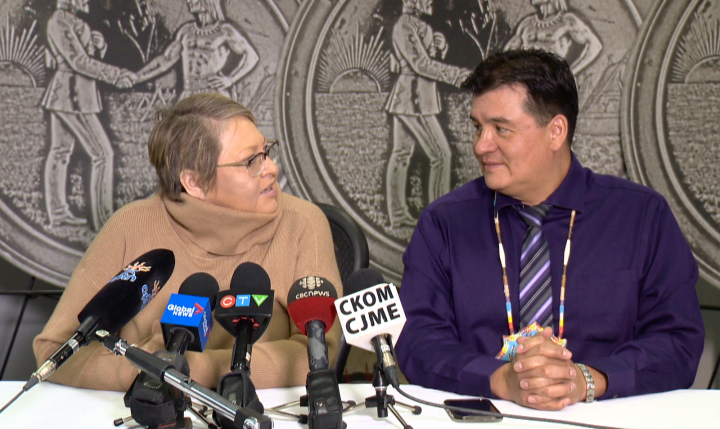A Saskatchewan chief who represents 74 First Nations says federal support is urgently needed to avoid the “travesty” of the novel coronavirus making its way to remote communities.

“They’re not listening or not taking the direction from the First Nations,” said Federation of Sovereign Indigenous Nations (FSIN) Chief Bobby Cameron.
“I’ve heard from many, many chiefs and councils across Canada, ‘Bobby, we need a lot of help. We need the services.’”
FSIN officials pointed out the potential for COVID-19 to disproportionately harm Indigenous communities, particularly northern nations suffering from poverty, poor housing and limited access to transportation and health-care services.
“It would be disastrous. We’re looking at communities that are so close-knit and … they gather together continuously,” Vice Chief Heather Bear said.
Bear said she has seen up to 19 people living in a single-family home — not exactly prime conditions for self-isolation.
The FSIN is calling on the federal government to heavily invest in isolated communities, allowing testing clinics and health-care workers to set up shop on reserve temporarily.
Saskatchewan’s chief medical officer said he has been in talks with Indigenous Services Canada, exploring how to address the issue.
“There has to be an integrated approach between primary care networks within the Saskatchewan Health Authority and First Nations,” Dr. Saqib Shahab said.
Friday afternoon, the Saskatchewan Health Authority opened two testing centres for COVID-19 in Saskatoon and Regina. One in Prince Albert is scheduled to open March 16.
Bear said testing is not currently possible for many isolated communities, which don’t have the medical supports required to handle a COVID-19 case.
Cameron said the goal is to get ahead of the spread of the virus. As such, the FSIN has cancelled many upcoming events and is advising against out-of-province travel.
The FSIN is sharing key coronavirus messaging with its member nations: wash your hands, avoid large gatherings, and stock up on food — something Bear noted may be difficult in communities where food is flown in and expensive.
If a novel coronavirus case is confirmed on a member nation, the FSIN said it will work with the SHA and Canada’s First Nations and Inuit Health Branch to provide as much support as possible.
“To get the services or to get medicines, it’s going to be extremely challenging,” Cameron said.
“We can only pray and do our best to avoid this travesty from happening.”
Trudeau was set to meet with premiers and Indigenous leaders Friday afternoon to discuss the next steps.









Comments